HMCS Huron Tales
By Steve Stevenson
Joining the ship's company of HMCS Huron was another unforgettable moment in my life. At Cornwallis I'd shared an entire building with 64 people; I was now assigned to a WW2 377ft Tribal Class Destroyer with a crew of about 245 men. I was an Engineering Mechanic (a stoker) who lived in a mess deck with about 30 others. It was a single cosy room below the waterline, which had hammocks for beds which hung from the ceiling.
We all shared a washroom, above the deck, and had to pick up our food from the upper deck galley. No cafeteria. On the midnight watch, when the cooks were off duty, they would leave loaves of bread and plates of sliced meat on a shelf at the galley entrance, with a large bowl of melted butter. We got a paintbrush to apply it to the bread. No frills.
In the engine room during the middle watch it was not a very quiet time. Stokers had to make fresh water, as well as maintain the engine room. We did this by filling up the large evaporator with seawater, boiling it with super-heated steam sent through the unit's internal coils to separate the salt from the seawater. Following an appropriate time steaming, the steam would be shut off and cold water would be sent through the same coils. All salt would end up coating the internal coils of the unit. Next, empty the now fresh water from the unit to the fresh water separate tank. Then open the unit (no small feat) and bang off all the salt coated on the coils. Finally, haul the many pails of salt up onto the upper deck and dump it back into the ocean. This duty had to be performed and timed perfectly. If the crew tasted salt in the water when sipping it with their rum the next morning at tot-time, you were in a heap of trouble.
Life on board was never dull when we occasionally went hunting for Russians – mostly those crewing large Russian factory fishing trawlers. They were illegally fishing in Canadian waters, with ladies in the crew, and were generally out at sea for a year at a time. They netted every species of fish, no exclusions, and they canned their catch onboard. They were very persistent though. As soon as we escorted them out of our waters and cleared the horizon, they came right back.
On another occasion we sailed to the far north in winter on a exercise with other ships of the fleet. When we awoke early the following morning, the ship was covered in six inches of ice. All hands were put to work immediately banging the ice off the ship with hammers. We must have removed tons of it.
To keep us fit and skilled at damage control, we had never-ending "action stations". Without warning, day and night, we were assembled to shore-up sections of the ship with 4x4 lumber. The object being that the ship's interior doors had been damaged by enemy shells and we were taking on water. We all were well-trained at these exercises. Thankfully we were never shelled.
One of my first sailings on HMCS Huron was to New York City, just before Christmas in 1961. I'd heard and seen a lot about the city on TV and in the movies, but I was hardly prepared for what I experienced there. On the first day docked I was given a map of the city and free tickets to some of the live TV shows downtown. I picked tickets for the shows I'd watched growing up and got excited. Johnny Carson's quiz show, "Who Do You Trust" was one of my favourites. I was amazed at the theatre; it had a live audience, and it was packed. It was lit up like a Christmas tree and everything was in Technicolour. At home, we watched the show on a 17" black & white TV, all snowy and staticky. Whoa, what a difference! Anyway, the show got underway and it was a lot more enjoyable than at home. Then came the first commercial break.
Johnny started telling a funny story, then stopped and went quiet and looked at us up in the balcony with his hand above his eyes like he was saluting and squinting at us. He then pointed at me and my mates (there were at least a 1/2 dozen of us), and said: "Oh No, Russians!!" He followed up saying, "Calm down everyone, everything is going to be OK. Just let me know if they do anything suspicious". The commercial ended and he went on with the show.
It was an amazing experience going from watching the show on a 17” TV at home, to being in New York and actually being in a Johnny Carson joke. Hard to forget that day. Much later, I learned that Johnny knew he was pulling our legs that afternoon. He had served as a naval officer on the USS Pennsylvania during WW2 from 1943-45.
I also managed to visit the top of the Empire State Building that day, a place I had always wanted to visit after watching the "King Kong" movie. But there was no sign of King Kong. Nevertheless, it was quite an experience. Our visit to New York was short because of the blistering cold weather. We were soon on our way home for Christmas leave.
Onboard Huron I also had the opportunity to travel quite extensively to the West Indies. Our trips took place in the winter when we had war games/manouvers there with the American navy on NATO "Exercise WINTEX". During shore leave we visited many of the Caribbean Islands; notably, Jamaica, Trinidad and Tobago during their independence day from Britain celebrations, and also to the Virgin Islands and Puerto Rico. The islands were marvellous and an unforgettable experience for me. I had never travelled anywhere tropical before.
My most amazing experience was visiting Port Antonio, Jamaica. On that occasion, the town did not have a large enough jetty to permit HMCS Huron to dock, so we had to anchor a short distance offshore. We soon learned that this was not to be a normal visit. Apparently, we had been invited to a private Independence Day celebration hosted by the family of the world-famous movie star, Errol Flynn. I couldn't believe it – he was one of my favourites. My family was nuts about the movies; we’d go during the week and even to Saturday matinees as well. There were no TVs in the early 50s in my world. I loved Flynn's movies, which he had been making since 1933 – he made over 60 movies during his career.
By late morning that day, our two motor cutters were ferrying a steady stream of crew members ashore to a dock on the Flynn beachfront property. I was shocked when I stepped ashore to see swimming pools with cabanas, manicured lawns and gardens, pool staff and bars with fancy drinks. Food was being prepared by chefs and the pool furniture was like something out of a Hollywood movie. Oh my God! After being welcomed, the regular crew were given free rein of the beach area, while ship officers and non-commissioned officers were invited to the family residence farther from the beach.
We mates really enjoyed the salt water pools and got far too much sun that day. We were treated like celebrities. We heard from staff that Flynn was quite a party-giver and that many of his movie star pals were regular visitors to his massive property. The party went on until way after dark and sadly, the motor cutters were soon ferrying us back to the ship. We never did meet Flynn himself though, as he had died several years earlier in Canada, at the Vancouver General Hospital of a heart attack. We were soon on our way out onto the Caribbean to our next adventure.
I learned later from one of our petty officers that apart from movie stars who frequently visited, there were other famous people living nearby. He had spoken to someone at the family house who knew Ian Fleming, the James Bond author and former Royal Navy officer, during WW2. Fleming, who lived in London England, spent the winters near Port Antonio, not far from the Flynns, and wrote all of his 14 Bond books there. My petty officer friend was told that Fleming was currently at his home on his "Goldeneye" property writing his ninth Bond book. He was also told that Fleming's book, Dr. No, was being made into the first James Bond movie starring Sean Connery. Scenes were actually being filmed on the Goldeneye property, as well as at several other Jamaican locations. I knew all about James Bond books and had read all eight of them so far published. This whole experience was unbelievable. Eight months earlier if someone had told me this would be happening to me I would have thought them crazy. But here I was.
Many years later while thinking about writing down this tale, I looked a little deeper into a few things, one being Ian Fleming's naval history. I found out he had been a Lieutenant Commander with Britain's Naval Intelligence Division during the war. He worked on top-secret "Operation Goldeneye"; its purpose was to monitor Spanish government activities, using undercover British spies, to determine Spain's possible involvement with Germany and the Axis partners. If they found Spain's dictator Franco was aligning with Hitler, they were to sabotage whatever activities they could. Luckily, Franco was kept busy with their civil war between 1939-1945 and remained neutral. Fleming used his wartime spying experience to a great extent when he penned his Bond books. In 1946 he bought his 46-acre Port Antonio area property and named it "Goldeneye".
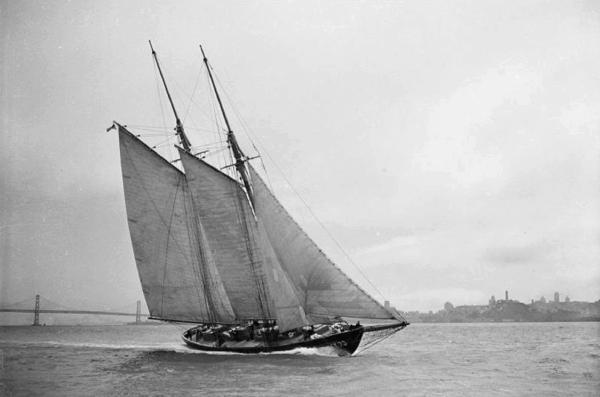
Zaca in her navy days in San Francisco.
– Photo Southern Woodenboat Sailing
Similarly, when I checked Flynn's history, I learned his first love was sailing, and he had spent endless hours at sea. He was used to the sea, as he was born in Tasmania. Throughout his life he owned large sailing boats and actually found Port Antonio after being washed ashore there in a storm in 1946 on his yacht, the Zaca – formerly the USS Zaca. He absolutely loved it there and purchased a 1600-acre property on which he built his estate near Port Antonio, which following his death in 1959, was then owned by his 3rd wife Patricia Wymore until her death in 2014. She also was a movie star and worked in television and movies until she retired in the mid-sixties. Zaca outlived them both, and is currently a private yacht, based in Monaco.
Another of his properties was the 64-acre Navy Island close by (which he won in a poker game). Although he never built there, he used the island for endless parties. He found out later that the island had been used by the Royal Navy in the late 1700s for a gun battery, and that the famous Vice Admiral William Bligh of "Mutiny on the Bounty" fame, had used the shallows of the island as a careening station which was where ships' hulls were tipped in the shallows to enable the removal of barnacles. Flynn found this fact amusing since he had starred as Fletcher Christian in his first movie "In the Wake of the Bounty" in 1933; and there he was, owning an island where Bligh had been stationed about 155 years earlier.
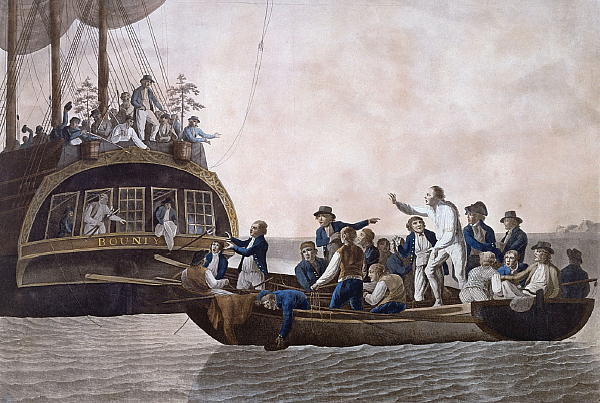
Fletcher Christian and the mutineers set William Bligh and 18 others adrift, in a 1790 aquatint by Robert Dodd.
Fletcher Christian who led the HMS Bounty mutiny, apparently due to harsh treatment by Bligh, ordered Bligh into the ship’s cutter, with 18 crew members and thankfully with some drinking water, salt pork, tool chests and a sextant. The cutter then sailed for 4000 miles before safely reaching a proper port in Timor Indonesia. HMS Bounty was a 91-foot, three masted, armed 14-gun vessel. When the mutineers reached their final destination on Pitcairn Island, the ship was burned.
Speaking of unforgettable experiences, there were a few others onboard Huron. Returning from the Caribbean after my first visit there in March 1962, we learned that an Atlantic Ocean freak storm, coming out of nowhere, could become a force to be reckoned with. When it hit, we were ordered to lock all external doors and that under no condition were we to go out onto the upper deck, even over the elevated catwalks. The ship was tossed around like a cork in 30-foot plus waves. Steering through these large swells must have been a bridge nightmare. It was a large storm and it took quite a while to be clear of it. When things finally calmed down, many of us were allowed on deck to see what damage had been done and to make repairs. It was severe – motor cutters had been torn from their moorings and the after-steering column had been uprooted from the afterdeck, fastening bolts and all. There was minor damage throughout ship. We cleaned up the best we could, while discussing how lucky we were to have made it through the storm. I personally thought we were done for. Before long we were back in Halifax. Whew!
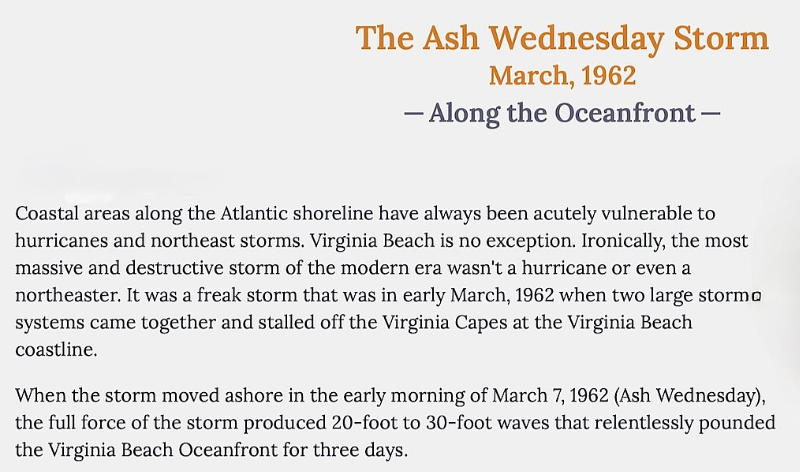
During a separate trip, I learned that the Atlantic had an opposite side. It could be as gentle and as calm as a swimming pool. On that occasion, I was on duty in the engine room when we received a message to stop ship. After doing so and going up on deck, we learned that it was time for a swim! Going up on deck I watched the crew stripping-down and changing into shorts. Others were lowering a huge 'scramble-net' over the starboard side. (This was a heavy net used during wartime to pull oil-soaked and exhausted men aboard from a sinking ship). While I changed, I noticed that the sea was as calm and as warm as bathwater, the air temperature was over 90°F and there wasn't a whisper of wind. What was going on?
Before I jumped 15 feet over the side, I noticed that at several locations perched high above the upper deck there were guards with rifles at the ready. They were tasked with keeping an eye on the guys and the swimming area (about 15 feet off the ship side) and to watch out for sharks, or for any other curious creatures that might visit. Even hundreds of miles offshore, all of the thrashing about in the water could draw them. Luckily no shots were fired that day. The swim lasted for only about a half an hour until we heard someone yell "outta the pool". We all climbed easily up the net – pool time was over. It was time to get back to work.
I learned later that these type of ocean conditions are not predictable. They just come about quickly. When ships' captains see these seas, they on occasion will stop their ships far out at sea and give the crew a swim break.
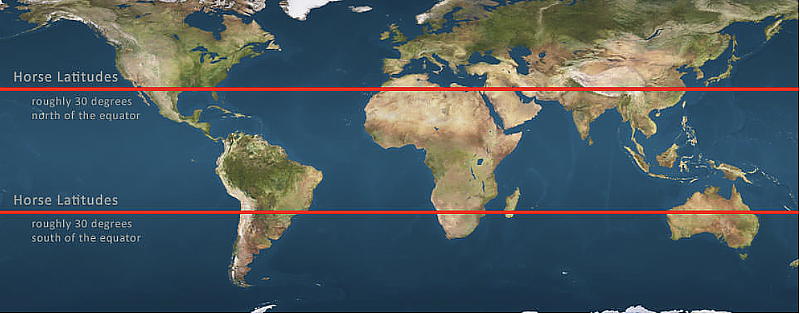
These seas occur in the 'Horse Latitudes'. These are regions located at about 30-60 degrees north and south of the equator, affected by trade winds, and are characterized by calm winds, sunny skies, and calm seas. They are called the 'Horse Latitudes' because in the time of sailing ships way back when, these conditions seriously stalled their passage by days, or even weeks, to the new world from Europe. This especially created drinking water problems and the need to ration water. As many ships were loaded with horses being sent to the new world, this compounded the problem. As a result, many horses died or became sick due to a lack of water. These poor creatures were sadly thrown overboard. Hence the name 'Horse Latitudes'.
Upon later joining the crew of HMCS Haida, I was a seasoned traveler and had the opportunity to continue travelling to many other places.
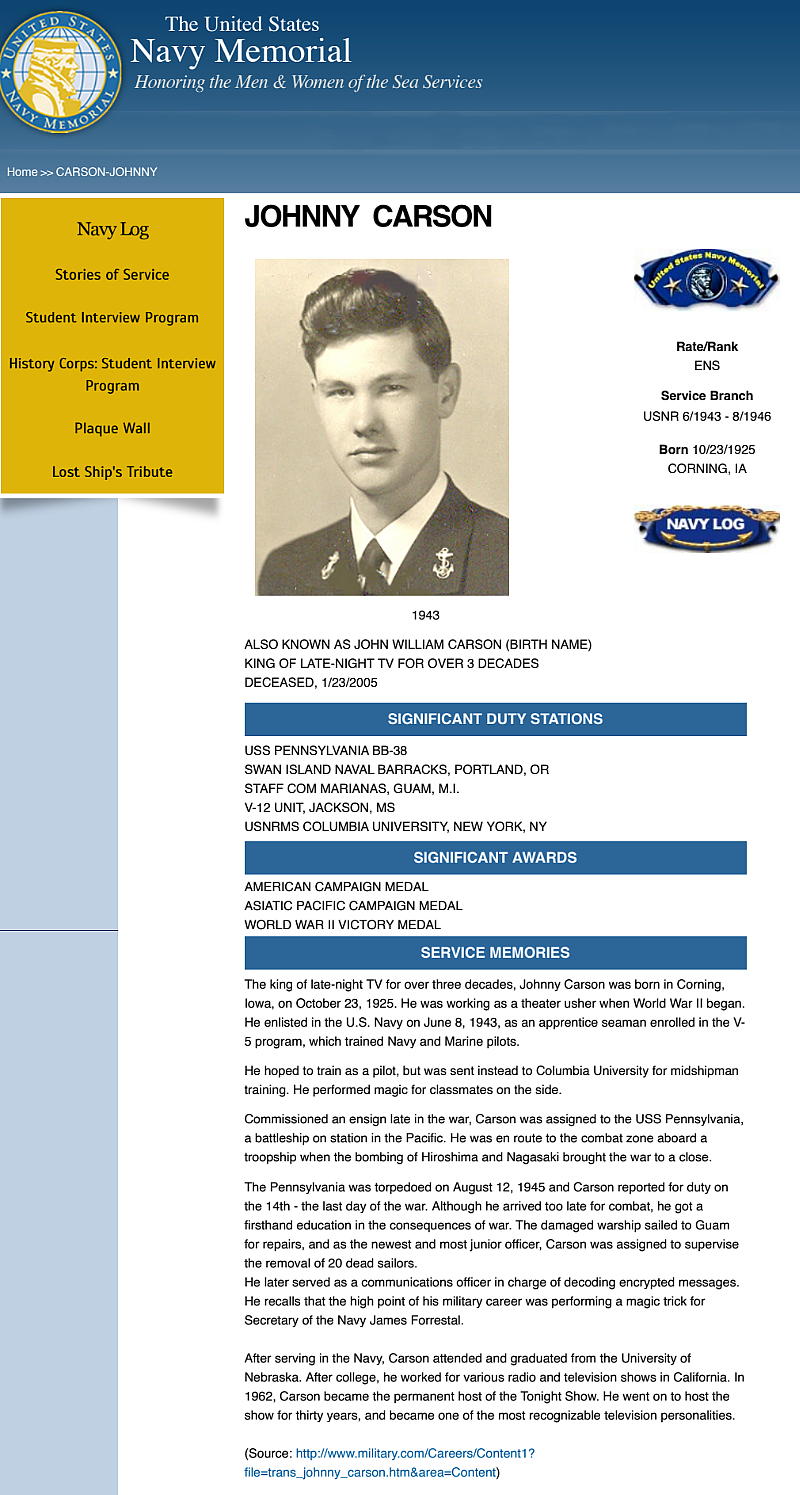
Can you provide comments or corrections?
Please email Charlie Dobie.